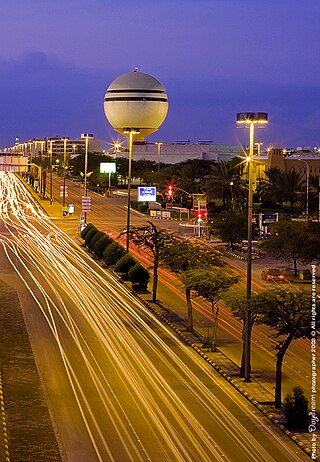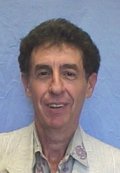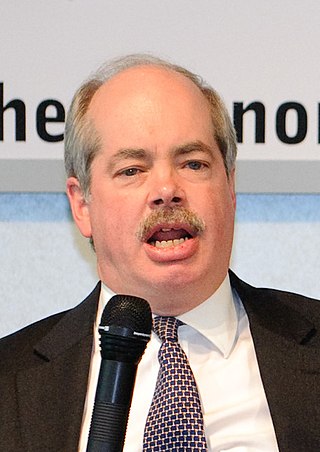The State of the World (SoW) was a series of books published annually from 1984 to 2017 by the U.S. based Worldwatch Institute, a thinktank that was founded in the 1970s by renowned environmentalist Lester R. Brown and ceased operations in 2017. The series attempted to identify the planet's most significant environmental challenges.
The Worldwatch Institute was a globally focused environmental research organization based in Washington, D.C., founded by Lester R. Brown. Worldwatch was named as one of the top ten sustainable development research organizations by Globescan Survey of Sustainability Experts.
Overconsumption describes a situation where a consumer overuses their available goods and services to where they can't, or don't want to, replenish or reuse them. In microeconomics, this may be described as the point where the marginal cost of a consumer is greater than their marginal utility. The term overconsumption is quite controversial in use and does not necessarily have a single unifying definition. When used to refer to natural resources to the point where the environment is negatively affected, it is synonymous with the term overexploitation. However, when used in the broader economic sense, overconsumption can refer to all types of goods and services, including manmade ones, e.g. "the overconsumption of alcohol can lead to alcohol poisoning". Overconsumption is driven by several factors of the current global economy, including forces like consumerism, planned obsolescence, economic materialism, and other unsustainable business models and can be contrasted with sustainable consumption.

Buraidah is the capital and largest city of Al-Qassim Region in north-central Saudi Arabia in the heart of the Arabian Peninsula. Buraydah lies equidistant from the Red Sea to the west and Persian Gulf to the east. It is known for its dates festival which is the biggest in the world with extensive variety of dates. It has been called the city of dates. On November 8, 2021, the United Nations Educational, Scientific and Cultural Organization "UNESCO" included the city of Buraidah among the UNESCO Network of Creative Cities.

Dani Rodrik is a Turkish economist and Ford Foundation Professor of International Political Economy at the John F. Kennedy School of Government at Harvard University. He was formerly the Albert O. Hirschman Professor of the Social Sciences at the Institute for Advanced Study in Princeton, New Jersey. He has published widely in the areas of international economics, economic development, and political economy. The question of what constitutes good economic policy and why some governments are more successful than others at adopting it is at the center of his research. His works include Economics Rules: The Rights and Wrongs of the Dismal Science and The Globalization Paradox: Democracy and the Future of the World Economy. He is also joint editor-in-chief of the academic journal Global Policy.
Hilary F. French is a environmental analyst. She is a Program Officer at the United Nations Environment Programme's Regional Office for North America.

Lester Russel Brown is an American environmental analyst, founder of the Worldwatch Institute, and founder and former president of the Earth Policy Institute, a nonprofit research organization based in Washington, D.C. BBC Radio commentator Peter Day referred to him as "one of the great pioneer environmentalists."

Robert Costanza is an American/Australian ecological economist and Professor at the UCL Institute for Global Prosperity, University College London. He is a Fellow of the Academy of the Social Sciences in Australia and a Full Member of the Club of Rome.

Paul Raskin is the founding president of the Tellus Institute, which has conducted over 3,500 research and policy projects throughout the world on environmental issues, resource planning, scenario analysis, and sustainable development. His research and writing has centered on propagating the Great Transition. Raskin has served as a lead author on a number of high-profile international reports, including the U.S. National Academy of Science's Board on Sustainability, the Millennium Ecosystem Assessment, the United Nations Environment Programme's Global Environment Outlook, the Earth Charter, and the Intergovernmental Panel on Climate Change (IPCC) Third Assessment Report.
The Global Water Policy Project (GWPP) was founded by Sandra Postel in 1994. Its aim is to promote the preservation of Earth's freshwater through research, writing, outreach and public speaking.

Christopher Flavin is the former president of the Worldwatch Institute, an independent research organization focused on natural resource and environmental issues, based in Washington, DC. He is also a founding member of the Board of Directors of the Business Council for Sustainable Energy and is a member of the National Academy of Sciences Board on Energy and Environmental Systems, the Climate Institute, and the Environmental and Energy Study Institute. His research and writing focus is international energy and climate policy. One of his popular quotes on Sustainability states "Building a world where we meet our own needs without denying future generations a healthy society is not impossible, as some would assert. The question is where societies choose to put their creative efforts".

Presented annually since 1991, the Stockholm Water Prize is an award that recognizes outstanding achievements in water related activities. Over the past three decades, Stockholm Water Prize Laureates have come from across the world and represented a wide range of professions, disciplines and activities in the field of water.
Robert Engelman is an American author and former journalist who writes about the environment and population and serves as Senior Fellow at the Worldwatch Institute. He was President of the institute from 2011 until 2014. His book More: Population, Nature, and What Women Want was published in 2008.
David William Schindler,, was an American/Canadian limnologist. He held the Killam Memorial Chair and was Professor of Ecology in the Department of Biological Sciences at the University of Alberta in Edmonton, Alberta. He was notable for "innovative large-scale experiments" on whole lakes at the Experimental Lakes Area (ELA) which proved that "phosphorus controls the eutrophication in temperate lakes leading to the banning of phosphates in detergents. He was also known for his research on acid rain. In 1989, Schindler moved from the ELA to continue his research at the University of Alberta in Edmonton, with studies into fresh water shortages and the effects of climate disruption on Canada's alpine and northern boreal ecosystems. Schindler's research had earned him numerous national and international awards, including the Gerhard Herzberg Gold Medal, the First Stockholm Water Prize (1991) the Volvo Environment Prize (1998), and the Tyler Prize for Environmental Achievement (2006).
IISD Experimental Lakes Area is an internationally unique research station encompassing 58 formerly pristine freshwater lakes in Kenora District, Ontario, Canada. In response to the International Joint Commission (IJC)'s 1965 recommendations related to transboundary pollution, the federal and provincial governments set aside these lakes to study water pollution. During the 1970s and 1980s, David Schindler, who was at that time 'Canada's leading ecologist', conducted a series of innovative, landmark large-scale experiments in ELA on eutrophication that led to the banning of phosphates in detergents. In an unexpected and controversial move that was widely condemned by the scientific community, in 2012 the ELA was de-funded by the Canadian Federal Government. The facility is now managed and operated by the International Institute for Sustainable Development (IISD) and has a mandate to investigate the aquatic effects of a wide variety of stresses on lakes and their catchments. IISD-ELA used the whole ecosystem approach and makes long-term, whole-lake investigations of freshwater focusing on eutrophication.

Stephen Russell Carpenter is an American lake ecologist who focuses on lake eutrophication which is the over-enrichment of lake ecosystems leading to toxic blooms of micro-organisms and fish kills.

Pavan Sukhdev is an Indian environmental economist whose field of studies include green economy and international finance. He was the Special Adviser and Head of UNEP's Green Economy Initiative, a major UN project suite to demonstrate that greening of economies is not a burden on growth but rather a new engine for growing wealth, increasing decent employment, and reducing persistent poverty. Pavan was also the Study Leader for the ground breaking TEEB study commissioned by G8+5 and hosted by UNEP. Under his leadership, TEEB sized the global problem of biodiversity loss and ecosystem degradation in economic and human welfare terms, and proposed solutions targeted at policy-makers, administrators, businesses and citizens. TEEB presented its widely acclaimed Final Report suite at the UN meeting by Convention on Biological Diversity (CBD) in Nagoya, Japan.

Malin Fredrika Sofia Sundberg-Falkenmark was a Swedish hydrologist. Falkenmark is best known for her long-standing work and expertise on the sustainable use of water resources to meet human and ecosystem needs. Her work is characterized by an integration of both natural- and social-science approaches. She is particularly known for developing what is now known as the Falkenmark Water Stress Indicator, an indicator used to measure and describe the water available for human use. She was the daughter of Halvar Sundberg.

Georgia "Gia" Destouni is a Professor of Hydrology at Stockholm University. She works on the Baltic Sea Region Programme as well as studying the impact of climate change on societies in Northern Europe. She is the chair of the Global Wetland Ecohydrology Network (GWEN) and was involved with the National Geosphere Laboratory.

Susanna Wood is a New Zealand scientist whose research focuses on understanding, protecting and restoring New Zealand's freshwater environments. One of her particular areas of expertise is the ecology, toxin production, and impacts of toxic freshwater cyanobacteria in lakes and rivers. Wood is active in advocating for the incorporation of DNA-based tools such as metabarcoding, genomics and metagenomics for characterising and understanding aquatic ecosystems and investigating the climate and anthropogenic drivers of water quality change in New Zealand lakes. She has consulted for government departments and regional authorities and co-leads a nationwide programme Lakes380 that aims to obtain an overview of the health of New Zealand's lakes using paleoenvironmental reconstructions. Wood is a senior scientist at the Cawthron Institute. She has represented New Zealand internationally in cycling.













